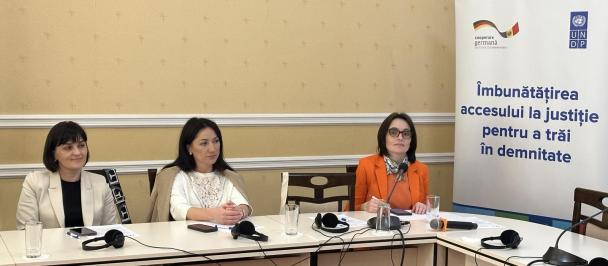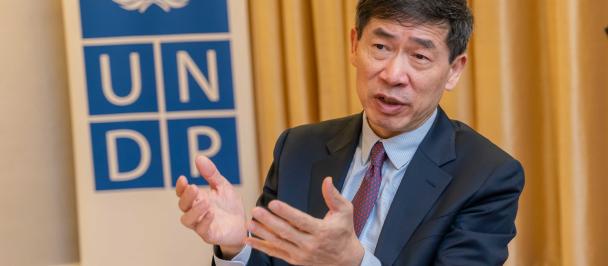UNDP Supports Eswatini to Align Policies and SDGs with National Budget
July 12, 2022
The Speaker at the House of Assembly, Hon. Petros Mavimbela, receives the newly-launched Strategic Plan from the Right Honourable Prime Minister, His Excellency Cleopas Dlamini, while the UNDP Resident Resident Representative, Ms. Rose Ssebatindira (left), looks on.
Policies such as the National Development Plan and Sustainable Development Goals are as good as non-existent if they are not adequately financed to transform the livelihoods of the poor.
Many countries across the world are struggling to integrate SDGs into national budgets to make sustainable development a reality. Eswatini faces a similar challenge. For instance, this year’s budget allocation to agriculture, was only 6% of the overall budget, well below the 10% standard prescribed by the AU Declaration 2003 Maputo Declaration on Agriculture and Food Security. This is despite that about two-thirds of the country’s population depends on subsistence. The Ministry of Labour and Social Security, budget allocation was only 1.5%, despite the growing increase in the unemployment rate by 33% (2021), and yet it has a critical mandate to create decent employment opportunities, particularly for young people.
Eswatini is at the dawn of a new National Development Plan for the period 2023-2028. This presents a golden opportunity for the country to develop clear actions and sectoral strategies to inch closer to the SDGs.
UNDP is supporting the country to enhance the capacity of the Parliament of the Kingdom of Eswatini to effectively play its oversight role. This is the moment to also ensure that the NDP and SDG financing responds to critical sectors, such as agriculture, that can propel productivity and transform the livelihoods of the most vulnerable. UNDP supported the Legislative body to develop a four-year Strategic Plan for the Kingdom, which, if effectively implemented, will enhance the regulatory and fiscal environment needed to accelerate progress toward reaching the SDGs targets. Through this support, Parliament also developed a website, an important platform to enhance communication and facilitate citizen participation in these processes.
At the launch of the strategic plan and the website for Parliament, H.E Cleopas Dlamini, the Prime Minister of Eswatini, confirmed the alignment of the two strategic documents to facilitate the achievement of the SDGs and Parliamentary objectives.
The Parliamentary Strategic Plan is “a roadmap that will bring about change because we believe that the implementation of this Plan will start with addressing administrative Parliament systems as well as procedural systems, which need constant revisiting,” he said. He also expressed the Government’s appreciation of the role of the UNDP partnership in developing the Plan and other initiatives in support of the country over many years.
Speaking at the same event, UNDP Resident Representative, Ms. Rose K. Ssebatindira, noted that the launch of the Parliamentary Strategic Plan is timely as it coincides with the ongoing development of the new National Development Plan 2022-2028. UNDP is also supporting this process, which presents a unique opportunity for alignment and capacity building.
“For this to happen, we must be deliberate on establishing linkages between these two strategic documents and ensure that the Parliament Strategic Plan is not implemented in isolation from the National Development Plan and the SDGs,” said Ms. Ssebatindira.
While Ms. Ssebatindira emphasised the importance of empowering parliamentarians to exercise their role effectively, she equally called for a greater focus and investment to empower citizens to understand the role of their Members of Parliament and how that contributes to their daily lives.
“The institution of parliament in all countries records high turnover, as citizens exercise their rights to choose their representatives. This right of democracy must enhance the parliamentary role. It is therefore imperative to ensure that the induction and capacity building of parliamentarians is institutionalized,” she said.
Describing UNDP as a constant pillar of support, Senate President, Ps. Lindiwe Dlamini, said the support has been very motivating considering that the development of the Strategic Plan took place when COVID-19 cases were escalating. However, she said, the consultations were made possible through technical and technological equipment that we received through UNDP support.
“Ours is just to commit to fostering our friendship and solidifying our joint effort towards the achievement of the Sustainable Development Goals, nationally and globally,” she said.
UNDP is the global UN lead institution on governance with a commitment under the corporate Strategic Plan 2022-2025 to support countries to “future proof” governance systems through anticipation, better management of risks, and local driving innovative solutions, including through digitization. By supporting the development of the Strategic Plan and website, UNDP is contributing to the country’s efforts to attain SDG 16, which speaks to Peace, Justice, and Strong Institutions.

 Locations
Locations



